By Sheila Bapat and Claire Downing, RISE Together Fund Program Officers, and Deborah Makari, RISE Together Fund Program Assistant
As a national funder who has for years invested in state and local communities, RISE Together Fund (RTF) believes in the importance of national funders investing locally, and we aim to demonstrate how national foundations can do this sensitively and effectively. We see local investment as critical to lifting up new generations of leaders of color who will strengthen our multiracial democracy. In 2018, RTF published Reshaping the Country: The Growth of Muslim, Arab and South Asian Communities in the United States. This original research uses census microdata to identify the top cities and states with Black, Arab, Middle Eastern, Muslim, and South Asian (BAMEMSA)[1] populations of at least 25,000 that saw the largest percentage of population growth from 2000 to 2016.[2]
Since 2018, RTF has been bringing this research to life through a range of strategies. First, we focus on building authentic relationships with local grassroots leaders from many of the cities and states identified in our 2018 report — this blog focuses on Minneapolis, Minnesota; Phoenix, Arizona; Seattle, Washington; and Georgia. In addition, we mobilize local funders to build awareness of the need to support BAMEMSA communities. Finally, we deepen our investment in civic engagement funding in several of these localities, to foster local BAMEMSA communities’ participation in our democracy.
Relationship Building with Grassroots Leaders
One example of how RTF has implemented this demographic research has been our engagement with BAMEMSA grassroots leaders in Minneapolis, Minnesota and Phoenix, Arizona. In the summer of 2019, RTF scheduled a 4-day site visit with several groups in Minneapolis to begin learning about needs in the region and connect with several key grassroots leaders, including Nausheena Hussain of Reviving the Islamic Sisterhood for Empowerment (Reviving Sisterhood) and Habon Abdulle of Ayada Leads. After multiple interactions with Reviving Sisterhood and Ayada Leads, RTF went on to support the organizations with small rapid response grants, and we invited both groups to participate in our capacity building programs on digital security, communications, and women’s leadership.
These relationships built in 2019 also proved critical in the aftermath of the murder of George Floyd in Minneapolis. As many Twin Cities-based organizations were dealing with the shock and racial reckoning in their city, RTF connected with several groups and provided them a platform to share updates and needs from the ground with RTF grantees, and with a listserv of more than 550 advocates and organizers throughout the country through RTF’s RISE Organizing project.
Also in 2019, RTF began reaching out to BAMEMSA-led organizations in Phoenix, Arizona that were identified through our landscape research. As a result of this outreach, RTF connected with organizations serving Somali refugee communities in the Phoenix area. We funded movement organizations with small grants to educate their communities about local city council elections, and to hold an educational convening on the Africa Ban and Muslim Ban repeal efforts.
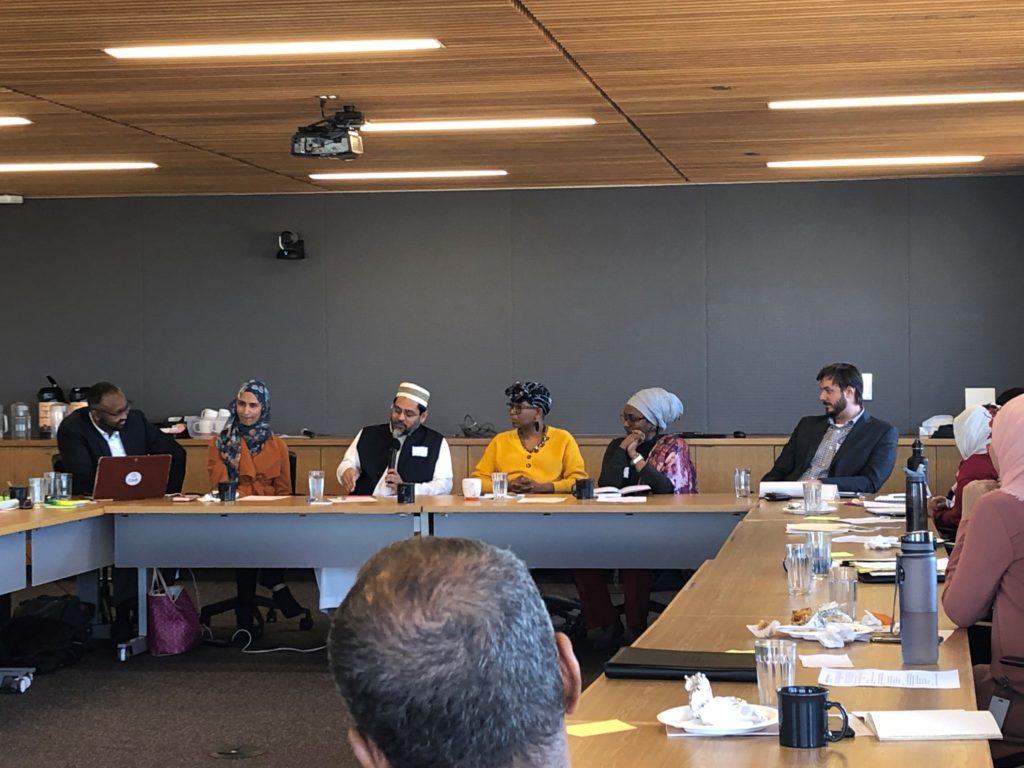
Mobilizing Funders
A key role RTF plays is to mobilize funders throughout the country to support BAMEMSA-led organizations. In 2018 and 2019, RTF held funder briefings in Seattle lifting up BAMEMSA communities in the area. In 2018, we held a round table connecting local leaders from BAMEMSA organizations to key funders. RTF returned to Seattle in Summer and Fall 2019 to meet with grassroots leaders and participate in Philanthropy Northwest’s “Philanthropy Deep Dive: Dismantling Islamophobia, Championing Community.” This three-hour session brought together approximately 30 grassroots and philanthropic leaders in Seattle to discuss strengthening investment in the region to fight Islamophobia. Our engagement in Seattle also led us to fund the Iraqi Community Center of Washington, a Seattle-based organization that serves refugee communities; indeed, our national vantage point on the BAMEMSA field enables us to identify and engage small, new, far-flung groups and showcase their work for funders.
And following our site visit in Minneapolis the summer of 2019, RTF organized an October 2019 panel for a Minnesota-based funder audience that drew more than 40 local, state, and national funders, and featured local leaders like Reviving Sisterhood. We heard from BAMEMSA groups that the October 2019 panel was the first time funders had convened specifically to learn more about BAMEMSA communities.[3] This was a theme borne out in the landscape research report in places like North Carolina, Tennessee, and others – that communities were not well-integrated in local and state funders’ portfolios, and in some cases had faced resistance from philanthropy.
RTF’s funder education efforts can serve as a model to help address this challenge. Our funder panels demonstrate the diversity of the BAMEMSA community in a locality, by consciously uplifting communities of color – particularly Black immigrant and African American Muslims – and women at the center of our programming. RTF’s landscape research gives local funders the data they needed to expand their portfolios, or at the very least, take a hard look at why BAMEMSA communities weren’t consciously integrated into existing or new funding opportunities.
Civic Engagement Investment to Build Power for the Future
A core objective of RTF’s local outreach and funder engagement is to strengthen grassroots organizations’ capacity to ensure their communities are active participants in our democracy. In 2020, after having built a relationship with each organization, we made significantly larger grants to Reviving Sisterhood and Ayada Leads in Minneapolis, so each group could expand their nonpartisan voter outreach efforts. Per our landscape research, RTF also deepened our funding for grantees in Georgia, including Georgia Muslim Voter Project.
Critically, all of these grantees were invited into our new capacity building initiative to improve access to voter data and provide technical assistance to hone their nonpartisan outreach to newly identified voters. Indeed, through a separate research project in 2019, RTF identified that small, grassroots BAMEMSA organizations do not have civic engagement infrastructure to power their nonpartisan voter outreach efforts, and in 2020 we intentionally addressed that gap. Early evaluation of our grantees’ data demonstrates that RTF’s investment enabled 2 million nonpartisan communications with high-potential BAMEMSA voters throughout the country.
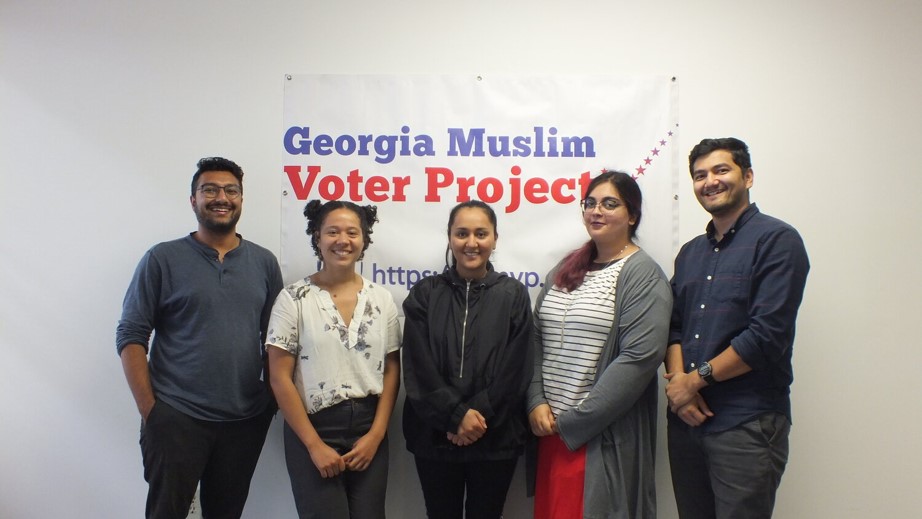
Looking Ahead
Since our landscape research was published in 2018, RTF has made 28 grants in response to this research, totaling approximately $600,000. As new census data emerges this year, RTF expects to revisit and “refresh” our landscape research. While COVID-19 has put our in-person engagement on hold, we plan to continue building meaningful relationships with more local leaders, mobilizing funders, and equipping more organizations to build power over the long term.
It is often the case that national funders “swoop in” to local communities and may not take the time to understand local dynamics and complexities. Our local grantees make clear to us every day why sensitive local investment is crucial. As Shafina Kabani, Executive Director of our grantee Georgia Muslim Voter Project, noted, “When it comes to building power, we have to get proximate — and that means funding locally, to foster support and collaboration for groups on the ground.”
In 2018, RTF commissioned a research report called Reshaping the Country: The Growth of Muslim, Arab
and South Asian Communities in the United States. This research identified the metro regions and states
with the largest percentage of population growth from 2000 to 2016 of the communities that RTF
serves—Black, Arab, Middle Eastern, Muslim, and South Asian (BAMEMSA). Over the past three years,
we have used this research to increase the geographic diversity of our grantmaking.
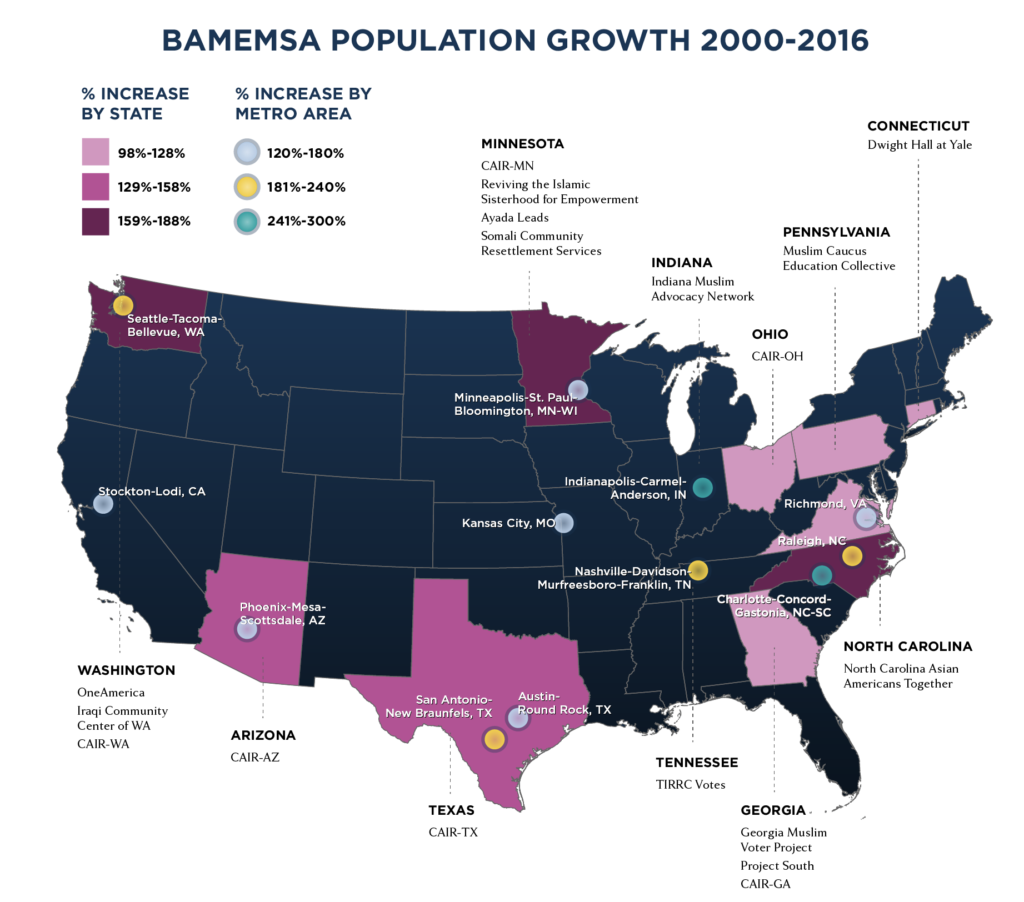
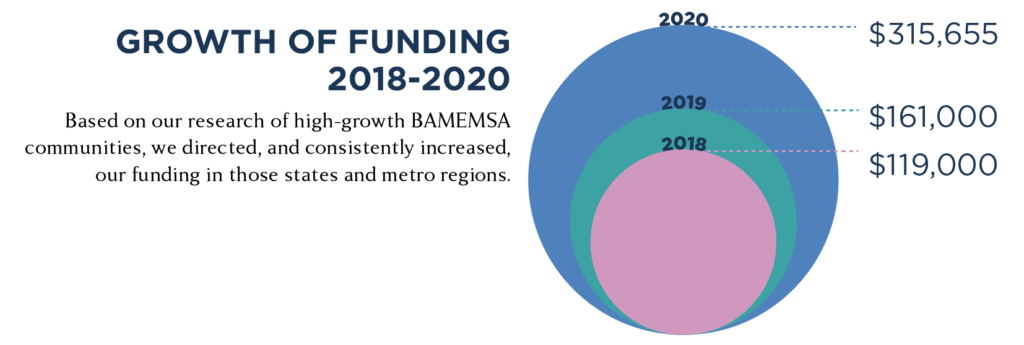
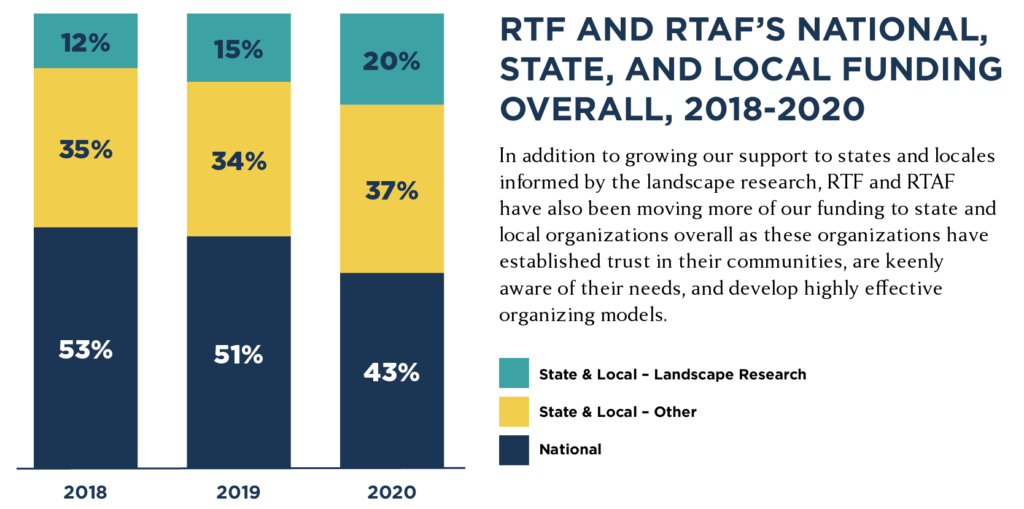
In 2018, RTF commissioned a research report called Reshaping the Country: The Growth of Muslim, Arab
and South Asian Communities in the United States. This research identified the metro regions and states
with the largest percentage of population growth from 2000 to 2016 of the communities that RTF
serves—Black, Arab, Middle Eastern, Muslim, and South Asian (BAMEMSA). Over the past three years,
we have used this research to increase the geographic diversity of our grantmaking.



[1] This year, RISE Together Fund has changed the acronym we use to describe our field. Noting that the previous term, “Muslim, Arab and South Asian,” was not sufficiently inclusive nor did it accurately reflective of the communities our grantees serve, we have shifted to Black, Arab, Middle Eastern, Muslim, and South Asian (BAMEMSA). This blog post reflects our new acronym.
[2] Researchers also conducted a field scan and interviews with local BAMEMSA leaders, activists, and organizers to understand the socioeconomic and political trends driving change alongside the population growth of BAMEMSA communities in each locale identified by the census microdata; these include, among others, the growth of white supremacy and the growth of the tech industry pulling in mainly Black Muslim immigrant low-wage workers.
[3] Eighty percent of participants who responded to our post-event survey indicated they would fund one or more groups featured on the panels, underscoring the event’s impact.